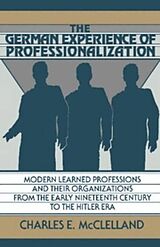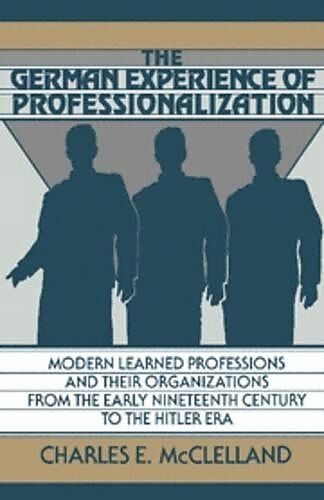The German Experience of Professionalization
Einband:
Fester Einband
EAN:
9780521394574
Untertitel:
Modern Learned Professions and Their Organizations from the Early Nineteenth Century to the Hitler Era
Genre:
Allgemeines & Lexika
Autor:
Charles E. McClelland, McClelland Charles E.
Herausgeber:
Cambridge University Press
Anzahl Seiten:
268
Erscheinungsdatum:
25.02.2003
ISBN:
0521394570
Klappentext Modern learned professions (medicine! law! teaching! engineering! and others) developed in central Europe just as vigorously as in England or America. Yet their close relationship with state power--more typical of the world development of professions than the Anglo-American model--led to a different historical experience of professionalization. This work is the first to explore that experience in a comprehensive way from the time when modern learned professions arose until the eve of World War II. Based on the history and surviving records of German professional organizations! this work shows how the learned professions emerged gradually in the nineteenth century from the shadow of strong state regulation to achieve a high degree of autonomy and control over professional standards by the First World War. By studying professional groups collectively! it gives a more contoured picture of their fate under National Socialism than works dedicated primarily to the phenomenon of fascism itself. Zusammenfassung This work is the first to explore the historical experience of the learned professions in Germany from the time when they arose until the eve of World War II. It gives a more contoured picture of their fate under National Socialism than works dedicated primarily to the phenomenon of fascism itself. Inhaltsverzeichnis Acknowledgments; Abbreviations; Part I. The Problem of Professions in Germany: 1. Introduction; 2. Problems and methods in the history of modern German professions; Part II. The Transition to Modern Professions in the Early Nineteenth Century: 3. The beginnings of modern professions in Germany; 4. Professions between revolution and unification; Part III. Unified Professions in a Unified Germany?; 5. The organization of the 'free' professions: medicine, law, engineering, and chemistry; 6. Organization of state-service professions: teachers and the clergy; 7. Professional credentials in the new Reich; Part IV. Breakthrough and Breakdowns: The Professions Enter the Era of Cartels and Unions: 8. The 'free' professions, 1900-1918; 9. Law-based professions, 1900-1918; Part V. The Weimar era: 10. The 'free' professions under Weimar; 11. Professions based on law and pedagogy in the Weimar era; Part VI. The Fate of Professions Under and After Fascism: 12. Collaboration, coordination, and professionalization; 13. Conclusion; A word about sources; Index....
Klappentext
Modern learned professions (medicine, law, teaching, engineering, and others) developed in central Europe just as vigorously as in England or America. Yet their close relationship with state power--more typical of the world development of professions than the Anglo-American model--led to a different historical experience of professionalization. This work is the first to explore that experience in a comprehensive way from the time when modern learned professions arose until the eve of World War II. Based on the history and surviving records of German professional organizations, this work shows how the learned professions emerged gradually in the nineteenth century from the shadow of strong state regulation to achieve a high degree of autonomy and control over professional standards by the First World War. By studying professional groups collectively, it gives a more contoured picture of their fate under National Socialism than works dedicated primarily to the phenomenon of fascism itself.
Zusammenfassung
This work is the first to explore the historical experience of the learned professions in Germany from the time when they arose until the eve of World War II. It gives a more contoured picture of their fate under National Socialism than works dedicated primarily to the phenomenon of fascism itself.
Inhalt
Acknowledgments; Abbreviations; Part I. The Problem of Professions in Germany: 1. Introduction; 2. Problems and methods in the history of modern German professions; Part II. The Transition to Modern Professions in the Early Nineteenth Century: 3. The beginnings of modern professions in Germany; 4. Professions between revolution and unification; Part III. Unified Professions in a Unified Germany?; 5. The organization of the 'free' professions: medicine, law, engineering, and chemistry; 6. Organization of state-service professions: teachers and the clergy; 7. Professional credentials in the new Reich; Part IV. Breakthrough and Breakdowns: The Professions Enter the Era of Cartels and Unions: 8. The 'free' professions, 1900-1918; 9. Law-based professions, 1900-1918; Part V. The Weimar era: 10. The 'free' professions under Weimar; 11. Professions based on law and pedagogy in the Weimar era; Part VI. The Fate of Professions Under and After Fascism: 12. Collaboration, coordination, and professionalization; 13. Conclusion; A word about sources; Index.

Leider konnten wir für diesen Artikel keine Preise ermitteln ...
billigbuch.ch sucht jetzt für Sie die besten Angebote ...
Die aktuellen Verkaufspreise von 5 Onlineshops werden in Realtime abgefragt.
Sie können das gewünschte Produkt anschliessend direkt beim Anbieter Ihrer Wahl bestellen.
Loading...
Die aktuellen Verkaufspreise von 5 Onlineshops werden in Realtime abgefragt.
Sie können das gewünschte Produkt anschliessend direkt beim Anbieter Ihrer Wahl bestellen.
| # | Onlineshop | Preis CHF | Versand CHF | Total CHF | ||
|---|---|---|---|---|---|---|
| 1 | Seller | 0.00 | 0.00 | 0.00 |
